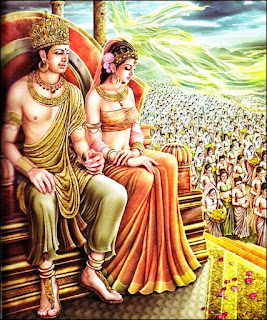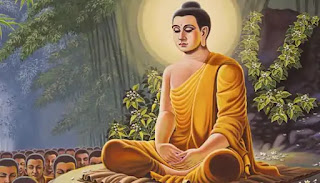Prior to Buddha becoming the revered one we refer to today like all of us he too was on a journey of discovery. In pursuit of this wholesome knowledge he abandoned all worldly possessions and comforts. Over the course of five or six years he studied under many gurus of the day but either learned nothing new or quickly surpassed their teachings.
Not long before his awakening he lived a solitary life which aided immensely to the extra-ordinary progress and strengthening of his mental concentration.
Living in utter seclusion for fifteen days, the noble Bodhisatta (Sidharth Gautama right before his awakening into Buddhahood), dreamed five Great Dreams after midnight, just approaching dawn on the fourteenth waxing day of the month of Vesākha (the second month of the Buddhist calendar).
The Five Great Dreams and Their Interpretation
1. When the Tathagata; worthy and rightly self-awakened; was still an un-awakened bodhisatta, this great earth was his great bed. The Himalayas, king of mountains, was his pillow. His left hand rested in the eastern sea, his right hand in the western sea, and both feet in the southern sea.
This first great dream appeared to let him know that he would awaken to the unexcelled right self-awakening.2. A woody vine growing out of his navel stood reaching to the sky.
This second great dream appeared to let him know that when he had awakened to the noble eightfold path, he would proclaim it well as far as there are human and celestial beings.
3. White worms with black heads crawling up from his feet covered him as far as his knees.
This third great dream appeared to let him know that many white-clothed householders would go for life-long refuge to the Tathagata.
4. Four different-colored birds coming from the four directions fell at his feet and turned entirely white.
This fourth great dream appeared to let him know that people from the four castes: priests, noble-warriors, merchants, and poor, having gone forth from the home life into homelessness in the Dhamma and Vinaya taught by the Tathagata, would realize unexcelled release.
This fifth great dream appeared to let him know that the Tathagata would receive gifts of robes, alms food, lodgings, and medicinal requisites and that he would utilize them without any attachment and clinging to them.
And it was with these dreams and their interpretation that Sidharth Gautama was then given the Four Noble Truths and the Noble Eightfold Path that was became the Buddha or the Enlightened One we know today. And on this day, which is called Vesak Day, Buddhists all around the world celebrate.
And with that my friends I wish you all peace and ease,
Vladimir
You are warmly invited to follow on us on Facebook and Instagram @bluelotuscenter for more way to improve your mindfulness practice and wellbeing.
Blue Lotus Meditation and Mindfulness Center is a registered 501(c)(3) religious organization.
Website and monthly newsletter: www.bluelotusmeditation.us
For guided meditations and Dharma talks, please visit and subscribe to our YouTube channel.













.png)